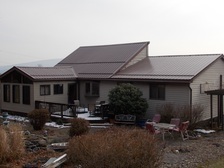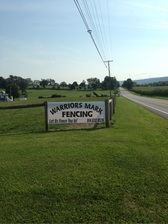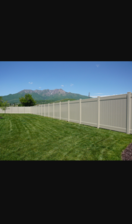
Get matched with top fencing pros in Huntingdon, PA
Enter your zip and get matched with up to 5 pros
Need a pro for your fencing service project in Huntingdon, PA?
Verified Reviews for Fencing Service pros in Huntingdon, PA
*The Angi rating for Fencing Service companies in Huntingdon, PA is a rating based on verified reviews from our community of homeowners who have used these pros to meet their Fencing Service needs.
*The HomeAdvisor rating for Fencing Service companies in Huntingdon, PA is a rating based on verified reviews from our community of homeowners who have used these pros to meet their Fencing Service needs.
Last update on January 12, 2026
Find Fencing pros in Huntingdon

Straight Way Enterprise LLC
Straight Way Enterprise LLC
residential fencing/pressure washing
"Jeff did a fantastic job! Our siding hadn’t been cleaned in several years, some of the hard to reach places in over 12 years. It looked amazing when he got finished with it! We won’t wait as long next time and will definitely hire Jeff to do it again. He was very thorough and careful with our shrubs and plants. Nice job! Great service!"
Rachel J on July 2019
residential fencing/pressure washing
"Jeff did a fantastic job! Our siding hadn’t been cleaned in several years, some of the hard to reach places in over 12 years. It looked amazing when he got finished with it! We won’t wait as long next time and will definitely hire Jeff to do it again. He was very thorough and careful with our shrubs and plants. Nice job! Great service!"
Rachel J on July 2019

Home-Aid Handyman
Home-Aid Handyman
Providing home repair and remodeling services to seniors that want to stay in their home longer but can no longer do the work, single professional women who own their own home and don't have the time or know how to do the maintenance, and dual income families that would rather be relaxing than working on their home.
Providing home repair and remodeling services to seniors that want to stay in their home longer but can no longer do the work, single professional women who own their own home and don't have the time or know how to do the maintenance, and dual income families that would rather be relaxing than working on their home.

Olde Glory Contractors Inc
Olde Glory Contractors Inc
We are a general contractor who specializes in storm restoration. From roofs, siding, windows and gutters. Interior repairs as well as water mitigation and restoration. When you call Olde Glory Contractors you are calling specialists who deal with insurance companies on a regular basis. Our main goal at Olde Glory Contractors is to use our company's knowledge and friendly staff to assist our customers by providing excellent service and superior products.
"Great people to have work for ya.michael and robin were awesome.. Very good team they have , great service provided. Would highy recomend. Thks so much for a great team. A+++++ to all involved"
Robert B on August 2020
We are a general contractor who specializes in storm restoration. From roofs, siding, windows and gutters. Interior repairs as well as water mitigation and restoration. When you call Olde Glory Contractors you are calling specialists who deal with insurance companies on a regular basis. Our main goal at Olde Glory Contractors is to use our company's knowledge and friendly staff to assist our customers by providing excellent service and superior products.
"Great people to have work for ya.michael and robin were awesome.. Very good team they have , great service provided. Would highy recomend. Thks so much for a great team. A+++++ to all involved"
Robert B on August 2020
5 Star Handyman & Maintenance Service
5 Star Handyman & Maintenance Service
Whether you’re looking for residential renovations or commercial construction in Centre County, when you’re in need of a general contractor you want to find a company that’s able to provide you with the complete package so that they can fulfill all of your project’s requirements. We are a full service general contractor that works hard to make sure that we do a great job for you while providing you with excellent service and an affordable price. We are committed to the idea of satisfying our customers from start to finish by making every job simple and convenient. Call us today at (814) 441-0583 to see how we can help you with all your general contractor needs in Centre County. Cost is determined by an hourly rate. Occasionally uses subs. Owner operated. No travel charges.
"He is very reliable and very professional, perfectionist, dependable, his work is highly recommended"
Thomas S on September 2020
Whether you’re looking for residential renovations or commercial construction in Centre County, when you’re in need of a general contractor you want to find a company that’s able to provide you with the complete package so that they can fulfill all of your project’s requirements. We are a full service general contractor that works hard to make sure that we do a great job for you while providing you with excellent service and an affordable price. We are committed to the idea of satisfying our customers from start to finish by making every job simple and convenient. Call us today at (814) 441-0583 to see how we can help you with all your general contractor needs in Centre County. Cost is determined by an hourly rate. Occasionally uses subs. Owner operated. No travel charges.
"He is very reliable and very professional, perfectionist, dependable, his work is highly recommended"
Thomas S on September 2020
LANDSCAPE II
LANDSCAPE II
Landscape Design/Build company 10-25 Employees Use subcontractors on occasion Licensed Contractor in Pennsylvania HIC# PA024796 3 Full Time Landscape Architects on Staff Landscape II has been in business for over 40 years. Some of our specialties include: Unique Design & Project oversight with architects Brick & Concrete Paver Walkways and Patios Use of Masonry & Natural Stone Natural Stone & Concrete Retaining Walls Contemporary and Traditional styles of Water Gardens Native Designs & Sustainable landscapes Decks, Pergolas & Structures Outdoor Kitchen & Fireplaces Creative Play Areas for families and children
"They are fast, highly skilled and they are worth the wait."
Lisa M on April 2020
Landscape Design/Build company 10-25 Employees Use subcontractors on occasion Licensed Contractor in Pennsylvania HIC# PA024796 3 Full Time Landscape Architects on Staff Landscape II has been in business for over 40 years. Some of our specialties include: Unique Design & Project oversight with architects Brick & Concrete Paver Walkways and Patios Use of Masonry & Natural Stone Natural Stone & Concrete Retaining Walls Contemporary and Traditional styles of Water Gardens Native Designs & Sustainable landscapes Decks, Pergolas & Structures Outdoor Kitchen & Fireplaces Creative Play Areas for families and children
"They are fast, highly skilled and they are worth the wait."
Lisa M on April 2020
MDG Construction
MDG Construction
MDG Construction is locally owned and operated. It employs 3 employees that are greatly dedicated to their detail of work. As a company we are defined as a General/Sub Contracting Agency. Most of our work comes from customer referals, Door-to-Door sales, Flyer, and Personal Advertisment.
MDG Construction is locally owned and operated. It employs 3 employees that are greatly dedicated to their detail of work. As a company we are defined as a General/Sub Contracting Agency. Most of our work comes from customer referals, Door-to-Door sales, Flyer, and Personal Advertisment.
P&W Remodeling
P&W Remodeling
Additional email - [email protected].
Additional email - [email protected].

Cisney & O'Donnell Inc
Cisney & O'Donnell Inc
Cisney & O'Donnell has been providing services in central Pennsylvania since 1969. We are dedicated to pleasing our customers and providing them with exceptional satisfaction. We have a wide variety of services available that range from any pool needs all the way to remodeling and building new homes. We have an outstanding reputation, dependable workmanship that includes a 2 year workmanship warranty, free estimates, fair prices and qulatily materials. We are open M-F from 8:00am-5:30pm year around and during the summer we are open Saturday from 9:00am-3:00pm. Call in and make an appointment today! Additional email - [email protected].
Cisney & O'Donnell has been providing services in central Pennsylvania since 1969. We are dedicated to pleasing our customers and providing them with exceptional satisfaction. We have a wide variety of services available that range from any pool needs all the way to remodeling and building new homes. We have an outstanding reputation, dependable workmanship that includes a 2 year workmanship warranty, free estimates, fair prices and qulatily materials. We are open M-F from 8:00am-5:30pm year around and during the summer we are open Saturday from 9:00am-3:00pm. Call in and make an appointment today! Additional email - [email protected].

Hampton Enterprise LLC
Hampton Enterprise LLC
Our mission at Hampton Enterprise LLC is to provide clients with superior customer service, quality work and speedy service in all aspects of their home improvement needs. Licensed, insured and trusted since 1989; come discover the Hampton difference today! We specialize in the installation and repair of Windows, Doors, Flooring, Sinks, Bathtubs, Showers, Sprinkler Systems and much more. We also offer Interior and Exterior Home Painting, Custom Welding Fabrication and Carpentry.Localy in your area just call and i will call back with a local number thank you . from James Hampton AL.Dothan 334-648-3817, AL Birmingham 334-648-3817, AL Huntsville 334-648-3817, AL Mobile 334-648-3817, AL Tuscaloosa 334-648-3817, AL Montgomery 334-578-4761, AR Little Rock 334-648-3817, AZ Phoenix 334-648-3817, CA LosAngeles/Sacramento 334-648-3817, CO Denver/Colorado Springs 334-648-3817, CT Hartford 334-648-3817, DE Dover 334-648-3817, FL Tallahassee 334-648-3817, FL Cape Canaveral/ Cocoa 334-648-3817, FL. Destin 334-648-3817, FL Gainsville 334-648-3817 Fl Jacksonville 334-648-3817, FL Orlando 334-648-3817, FL Panama City 334-648-3817, FL Tampa 334-648-3817, FL Miami 334-648-3817, GA Atlanta 334-648-3817, GA Albany 334-648-3817, GA Augusta 334-648-3817, GA Columbus 334-648-3817, GA Macon 334-648-3817, GA Valdosta 334-648-3817, IA Des Moines 334-648-3817, ID Boise 334-648-3817, IL Chicago/Springfield 334-648-3817, IN Indianapolis 334-648-3817, KS Levenworth/Topeka 334-648-3817, KY Frankfort 334-648-3817, LA New orleans/Baton Rouge 334-648-3817, MA Boston 334-648-3817, MD Annapolis 334-648-3817, ME Augusta 334-648-3817, MI Detroit/Lansing 334-648-3817, MN Saint Paul 334-648-3817, MO kansas City/Jefferson City 334-648-3817, MS Jackson 334-648-3817, MS Biloxi 334-648-3817, MS Gulf Port 334-648-3817, MT helena 334-648-3817, NC Raleigh 334-648-3817, ND Bismark 334-648-3817, NE Lincoln 334-648-3817, NJ Trenton 334-648-3817, NM Santa Fe 334-648-3817, NV Carson City 334-648-3817, NV Las Vegas 334-648-3817 NY Albany 334-648-3817, OH Columbus 334-648-3817, OK Oklahoma Ciy 334-648-3817, OR Salem 334-648-3817, PA harrisburg 334-648-3817, RI Providence 334-648-3817, SC Columbia 334-648-3817, SD Pierre 334-648-3817, TN nashville 334-648-3817, TX Austin 334-648-3817, UT Salt Lake City 334-648-3817, VA Richmond 334-648-3817, VT montpelier 334-648-3817, WI Madison 334-648-3817, WV Charleston 334-648-3817, WY Cheyenne 334-648-3817
"They guys suck."
Penny S on February 2024
Our mission at Hampton Enterprise LLC is to provide clients with superior customer service, quality work and speedy service in all aspects of their home improvement needs. Licensed, insured and trusted since 1989; come discover the Hampton difference today! We specialize in the installation and repair of Windows, Doors, Flooring, Sinks, Bathtubs, Showers, Sprinkler Systems and much more. We also offer Interior and Exterior Home Painting, Custom Welding Fabrication and Carpentry.Localy in your area just call and i will call back with a local number thank you . from James Hampton AL.Dothan 334-648-3817, AL Birmingham 334-648-3817, AL Huntsville 334-648-3817, AL Mobile 334-648-3817, AL Tuscaloosa 334-648-3817, AL Montgomery 334-578-4761, AR Little Rock 334-648-3817, AZ Phoenix 334-648-3817, CA LosAngeles/Sacramento 334-648-3817, CO Denver/Colorado Springs 334-648-3817, CT Hartford 334-648-3817, DE Dover 334-648-3817, FL Tallahassee 334-648-3817, FL Cape Canaveral/ Cocoa 334-648-3817, FL. Destin 334-648-3817, FL Gainsville 334-648-3817 Fl Jacksonville 334-648-3817, FL Orlando 334-648-3817, FL Panama City 334-648-3817, FL Tampa 334-648-3817, FL Miami 334-648-3817, GA Atlanta 334-648-3817, GA Albany 334-648-3817, GA Augusta 334-648-3817, GA Columbus 334-648-3817, GA Macon 334-648-3817, GA Valdosta 334-648-3817, IA Des Moines 334-648-3817, ID Boise 334-648-3817, IL Chicago/Springfield 334-648-3817, IN Indianapolis 334-648-3817, KS Levenworth/Topeka 334-648-3817, KY Frankfort 334-648-3817, LA New orleans/Baton Rouge 334-648-3817, MA Boston 334-648-3817, MD Annapolis 334-648-3817, ME Augusta 334-648-3817, MI Detroit/Lansing 334-648-3817, MN Saint Paul 334-648-3817, MO kansas City/Jefferson City 334-648-3817, MS Jackson 334-648-3817, MS Biloxi 334-648-3817, MS Gulf Port 334-648-3817, MT helena 334-648-3817, NC Raleigh 334-648-3817, ND Bismark 334-648-3817, NE Lincoln 334-648-3817, NJ Trenton 334-648-3817, NM Santa Fe 334-648-3817, NV Carson City 334-648-3817, NV Las Vegas 334-648-3817 NY Albany 334-648-3817, OH Columbus 334-648-3817, OK Oklahoma Ciy 334-648-3817, OR Salem 334-648-3817, PA harrisburg 334-648-3817, RI Providence 334-648-3817, SC Columbia 334-648-3817, SD Pierre 334-648-3817, TN nashville 334-648-3817, TX Austin 334-648-3817, UT Salt Lake City 334-648-3817, VA Richmond 334-648-3817, VT montpelier 334-648-3817, WI Madison 334-648-3817, WV Charleston 334-648-3817, WY Cheyenne 334-648-3817
"They guys suck."
Penny S on February 2024
The Huntingdon, PA homeowners’ guide to fencing services
From average costs to expert advice, get all the answers you need to get your job done.
 •
•Get a detailed breakdown of chain link fence repair costs, including average prices, cost factors, and tips to help homeowners budget for repairs.

Silt fence installation costs vary depending on the size of the lot, the fencing type, and the installation technique. Use this guide to get the budget right.

Aluminum fence costs depend on your fence’s height, thickness, design, and length. Explore all the cost factors in this guide.

What is chain link fencing, anyway? Chain link fencing has a lot to offer, so consider this option when installing a fence on your property.

Wondering how to hire a fence contractor who will do the perfect job? Use our tips to figure out which questions to ask contractors before you hire one.

Comparing vinyl vs. aluminum fencing is a question many homeowners consider when installing a new fence. Here's how to narrow down your choice.
- Petersburg, PA Fencing pros
- Mount Union, PA Fencing pros
- Williamsburg, PA Fencing pros
- Atkinsons Mills, PA Fencing pros
- Todd, PA Fencing pros
- Pennsylvania Furnace, PA Fencing pros
- Alexander Springs, PA Fencing pros
- Belleville, PA Fencing pros
- Menno, PA Fencing pros
- Warriors Mark, PA Fencing pros
- Tyrone, PA Fencing pros
- Pine Grove Mills, PA Fencing pros
- Orbisonia, PA Fencing pros
- Antis, PA Fencing pros
- Bellwood, PA Fencing pros
- Altoona, PA Fencing pros
- Hollidaysburg, PA Fencing pros
- Martinsburg, PA Fencing pros
- Port Matilda, PA Fencing pros
- Three Springs, PA Fencing pros
- State College, PA Fencing pros
- Duncansville, PA Fencing pros
- Saxton, PA Fencing pros
- Roaring Spring, PA Fencing pros
- Boalsburg, PA Fencing pros
- Concord, PA Fencing pros
- Lemont, PA Fencing pros
- Lewistown, PA Fencing pros
- East Freedom, PA Fencing pros
- Reedsville, PA Fencing pros
- 🌱 "Mow a small front yard"
- 🛠 "Fix a leaking pipe under the sink"
- 🏠 "Repair shingles on an asphalt roof"






